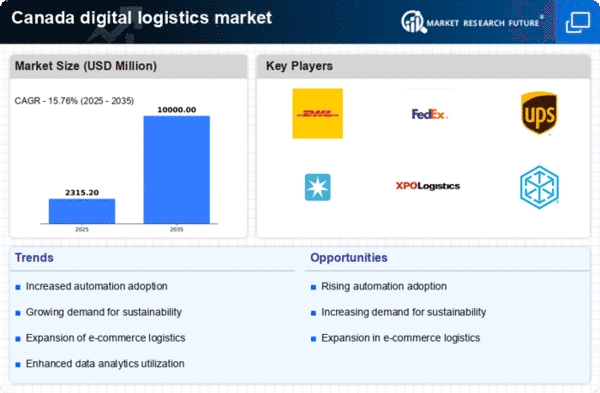E-commerce Growth
The rapid expansion of e-commerce in Canada is a primary driver for the digital logistics market. As online shopping continues to gain traction, logistics providers are increasingly required to adapt their operations to meet the demands of consumers. In 2025, e-commerce sales in Canada are projected to reach approximately $60 billion, indicating a robust growth trajectory. This surge necessitates advanced logistics solutions that can efficiently handle order fulfillment, inventory management, and last-mile delivery. Consequently, companies are investing in digital logistics technologies to streamline their processes, enhance customer satisfaction, and maintain competitive advantage in a crowded marketplace.
Sustainability Focus
The increasing emphasis on sustainability is shaping the digital logistics market in Canada. Companies are recognizing the importance of reducing their carbon footprint and adopting eco-friendly practices. This shift is prompting logistics providers to invest in digital solutions that optimize routes, reduce waste, and enhance energy efficiency. In 2025, it is projected that the market for green logistics solutions will grow by 15%, reflecting a broader commitment to sustainability. As businesses strive to align with consumer values and regulatory requirements, the focus on sustainability is likely to drive innovation and investment in the digital logistics market.
Consumer Expectations
Consumer expectations are evolving rapidly, influencing the digital logistics market in Canada. Today's consumers demand faster delivery times, greater transparency, and enhanced tracking capabilities. As a result, logistics providers are compelled to adopt digital solutions that meet these expectations. In 2025, surveys indicate that over 70% of Canadian consumers prioritize same-day or next-day delivery options, pushing companies to innovate their logistics strategies. This shift in consumer behavior is prompting investments in technologies that enable real-time tracking and efficient order processing. Consequently, the need to meet heightened consumer expectations is a significant driver of growth in the digital logistics market.
Regulatory Compliance
Regulatory compliance is becoming increasingly critical for the digital logistics market in Canada. The government has implemented various regulations aimed at enhancing safety, security, and environmental sustainability within the logistics sector. Companies must navigate these regulations to avoid penalties and ensure smooth operations. For instance, adherence to the Transportation of Dangerous Goods Act and other safety standards is essential for logistics providers. As compliance requirements evolve, businesses are investing in digital solutions that facilitate adherence to these regulations, thereby driving demand for advanced logistics technologies. This trend underscores the importance of regulatory compliance as a key driver in the digital logistics market.
Technological Advancements
Technological innovations are significantly influencing the digital logistics market in Canada. The integration of technologies such as artificial intelligence (AI), machine learning, and the Internet of Things (IoT) is transforming logistics operations. These advancements enable real-time tracking, predictive analytics, and automated warehousing solutions, which enhance operational efficiency. In 2025, it is estimated that investments in logistics technology will exceed $10 billion in Canada, reflecting the industry's commitment to modernization. As companies increasingly leverage these technologies, they are likely to improve their service offerings and reduce operational costs, thereby driving growth in the digital logistics market.
















